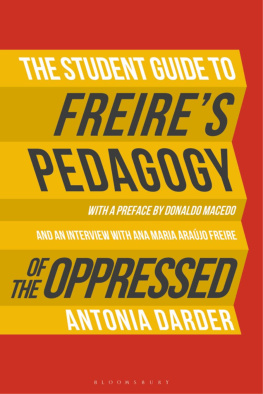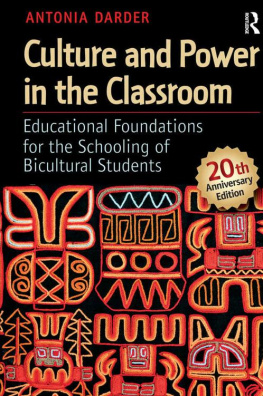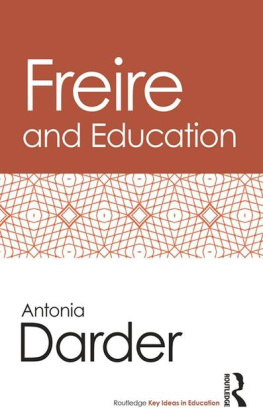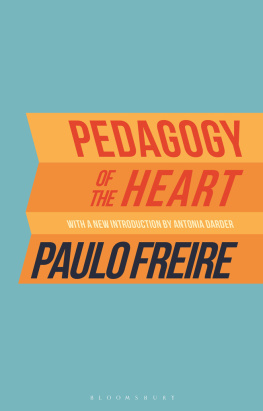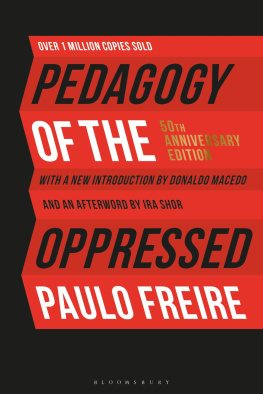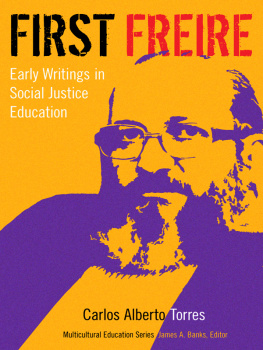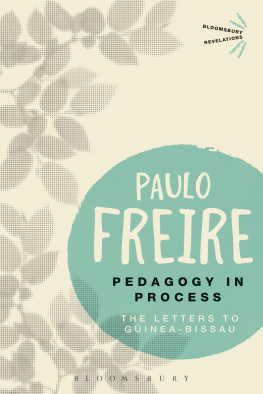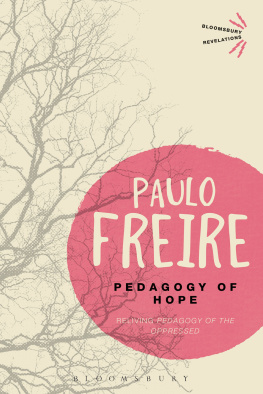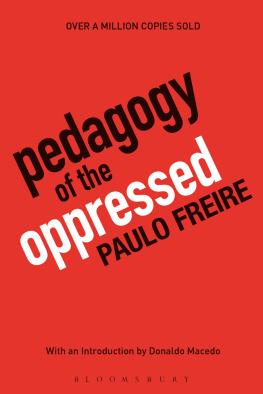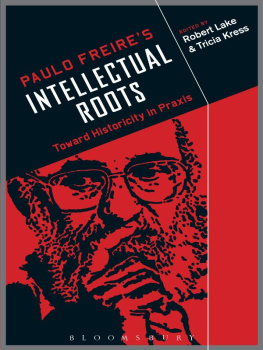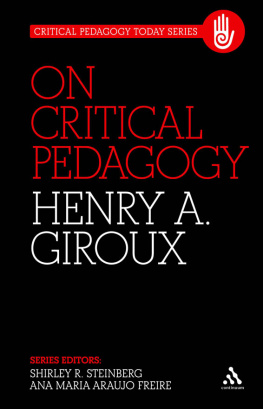Antonia Darder - The Student Guide to Freire’s Pedagogy of the Oppressed
Here you can read online Antonia Darder - The Student Guide to Freire’s Pedagogy of the Oppressed full text of the book (entire story) in english for free. Download pdf and epub, get meaning, cover and reviews about this ebook. year: 2019, publisher: Bloomsbury, genre: Science. Description of the work, (preface) as well as reviews are available. Best literature library LitArk.com created for fans of good reading and offers a wide selection of genres:
Romance novel
Science fiction
Adventure
Detective
Science
History
Home and family
Prose
Art
Politics
Computer
Non-fiction
Religion
Business
Children
Humor
Choose a favorite category and find really read worthwhile books. Enjoy immersion in the world of imagination, feel the emotions of the characters or learn something new for yourself, make an fascinating discovery.
- Book:The Student Guide to Freire’s Pedagogy of the Oppressed
- Author:
- Publisher:Bloomsbury
- Genre:
- Year:2019
- Rating:5 / 5
- Favourites:Add to favourites
- Your mark:
- 100
- 1
- 2
- 3
- 4
- 5
The Student Guide to Freire’s Pedagogy of the Oppressed: summary, description and annotation
We offer to read an annotation, description, summary or preface (depends on what the author of the book "The Student Guide to Freire’s Pedagogy of the Oppressed" wrote himself). If you haven't found the necessary information about the book — write in the comments, we will try to find it.
The Student Guide to Freire’s Pedagogy of the Oppressed — read online for free the complete book (whole text) full work
Below is the text of the book, divided by pages. System saving the place of the last page read, allows you to conveniently read the book "The Student Guide to Freire’s Pedagogy of the Oppressed" online for free, without having to search again every time where you left off. Put a bookmark, and you can go to the page where you finished reading at any time.
Font size:
Interval:
Bookmark:
The Student Guide to Freires
Pedagogy of the Oppressed
Also available from Bloomsbury
Education for Critical Consciousness, Paulo Freire
Paulo Freire, Daniel Schugurensky
Paulo Freires Intellectual Roots, edited by Robert Lake and Tricia Kress
Paulo Freires Philosophy of Education, Jones Irwin
Pedagogy of Hope, Paulo Freire
Pedagogy of the Heart, Paulo Freire
Pedagogy of the Oppressed, 50th Anniversary Edition, Paulo Freire
The Student Guide to Freires
Pedagogy of the Oppressed
Antonia Darder

This book is dedicated to the memory of Paulo Freire, whose work continues to inspire new generations of revolutionaries committed to a more just and loving world.
Paulo Freire: Early Epistemologist of the South
In todays context, Paulo Freire can be better understood as an early epistemologist of the South (Santos 2007), in that his epistemological sensibilities emerge from his contestation of what Quijano (2000) calls the coloniality of power inherent in Brazilian society of the early twentieth century. Rooted in a political economy that thrived on the poverty of the majority of people, Freire witnessed a complete moral disregard for the casualties left behind, despite the widespread presence of government and church institutions in Latin America and other parts of the worldwhich often turned a deaf ear and blind eye to human suffering. In the 1960s, Brazil, as a nation, was heavily embroiled in a contentious politics linked to its damaging legacy of Portuguese colonialism, and its own complex internal politics (Irwin 2012: 2). In response, Freires epistemological interventions can be understood in sync with the anticolonial preoccupations of Latin American philosophers and revolutionary writers such as Frantz Fanon, Albert Memmi, Aime Cesaire, Julius Nyerere, Amilcar Cabral, and others. In an unapologetic acknowledgment of the brutality of human oppression, Freires Pedagogy of the Oppressed sought to intentionally shift the focus away from a dehumanizing epistemology of knowledge construction toward a liberating and humanizing one. As such, Freires approach was imbued with an early decolonizing sensibility that directly linked material conditions of oppression to the brutal impact of cultural invasion imposed on the oppressed.
However, beyond these philosophical concerns, what often is left unacknowledged is the recognition of Freires distinct cultural origins, which as mentioned above are fully situated within both an early twentieth-century colonizing context of Latin America and an early Southern epistemological formation, which defies what Boaventura de Sousa Santos (2007) terms an abyssal divide characteristic of Eurocentric epistemicides and blatant forms of cognitive injustice (Paraskeva 2011). Of this abyssal divide, Santos (2007) of the West, and that assumes that A and non-A do not exclude each other (Fromm 1956).
Freire has often been critiqued for what might be deemed his Southern epistemological reading and reinvention of Western revolutionary ideascritiques, ironically, issued through narrow Western frameworks of scholars unable to suspend their belief in the existence of one correct, universal way to articulate truths; to which they alone are privileged with true clarity and insight. The challenges that Santos (2014) poses, in order to move beyond the abyssal divide, entail two main procedures ecologies of knowledges and intercultural translations. About this intercultural translation, Santos (2014) writes,
Because it is a work of mediation and negotiation, the world of translation requires that the participants in the translation process defamiliarize themselves to a certain extent vis--vis their respective cultural backgrounds. In the case of North/South translations, which tend to be also Western/non-Western translation, the task of defamiliarization is particularly difficult because the imperial North has no memory of itself as other than imperial and, therefore, as unique and as universal (223).
It seems that such difficulties with intercultural translation constitute, at times, precisely the epistemological challenges inherent in reading Pedagogy of the Oppressed. Moreover, central to this idea is that different types of knowledge are incomplete in different ways and that raising the consciousness of reciprocal incompleteness (rather than looking for completeness) is a precondition for achieving cognitive justice (212).
With Pedagogy of the Oppressed, Freire seeks to unveil the oppressor/oppressed contradiction and counter the closed system of Eurocentric rationalityepistemologies of blindness (Santos 2014)in education and society. This is a phenomenon that, unwittingly or unwittingly, blunts the capacity of the Western mind to grasp decolonizing ideas forged through epistemologies of the south. As such, hard positivist boundaries prevail between how this and that are defined and regulated as absolute categories, collapsing the dialectics of human thought to power relations, as well as denying the historicity and, thus, fragility and impermanence of all theoretical postulations. Within such restrictions, there is often an inability, generally unacknowledged, to grasp the paradoxical rationality of decolonizing epistemologies. It is for this reason that Freire embraces the unfinishedness of knowledge, in ways that openly engage the reciprocal incompleteness of the knowledge that teachers and students bring to the process of learning.
Over the years, various critiques of Freires Pedagogy of the Oppressed have been made about a variety of questions and contradictions in his work (Ohliger 1995). Many speak to sincere concerns and contradictions; which, as with all critiques, some are valid, while others not so much. Critiques have bemoaned the romanticization of Freires discourse, the problematics of applying Freires method, concluding that Freire, rather than being revolutionary, acted as a liberal member of a Catholic intellectual elite (Facundo 1984). Others called out Freires use of patriarchal language and his failure to engage questions of gender (Brady 1984) reflected in the manner he articulates the relationship of humans to animals. In many instances, Freire actually made intentional efforts to rethink his language and perspective, reflecting some shifts over the course of his lifetime.
However, antidialogical academic dismissals of Paulo Freires pedagogical praxis are often rendered by way of wholesale denial of his personal self-vigilance, willingness to enter into self-criticism, and commitment to open dialoguecharacteristics that remained central to his pedagogy and relationships, throughout his life. About the blind-spot of many critics, hooks (1994) asserts, in so much of Paulos work there is a generous spirit, a quality of open-mindedness that I feel is often missing from the intellectual and academic arena in U.S. society, and feminist circles have not been an exception (152). As such, to divorce Paulos words from their historical foundation and the profound political tensions inherent in the colonizing limitations of his era is to, wittingly or unwittingly, reinscribe the Western epistemological elitist gaze that Freire fought so persistently to derail in his scholarship, teaching, and everyday relationships. Similarly, another criticism of Freire, issued from those within and outside Brazil, is that he too easily conflates questions of education and politics. However, Irwin (2012) argues, This accusation underestimates the complex and specific analysis which Freire gives of education and the pedagogical process (46).
Next pageFont size:
Interval:
Bookmark:
Similar books «The Student Guide to Freire’s Pedagogy of the Oppressed»
Look at similar books to The Student Guide to Freire’s Pedagogy of the Oppressed. We have selected literature similar in name and meaning in the hope of providing readers with more options to find new, interesting, not yet read works.
Discussion, reviews of the book The Student Guide to Freire’s Pedagogy of the Oppressed and just readers' own opinions. Leave your comments, write what you think about the work, its meaning or the main characters. Specify what exactly you liked and what you didn't like, and why you think so.

